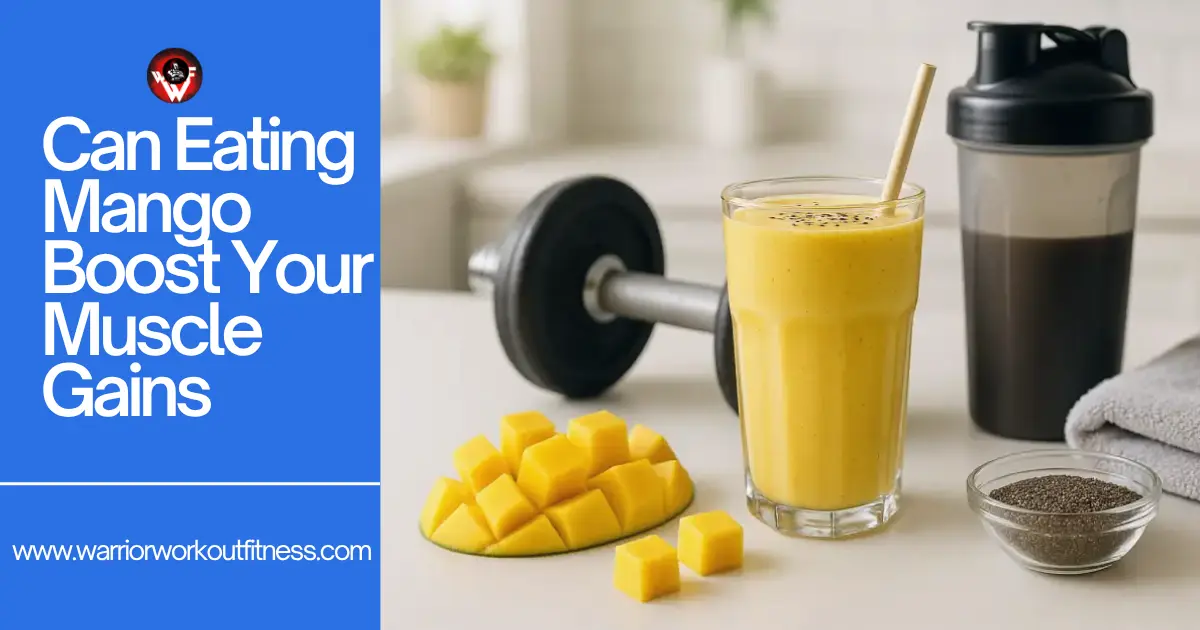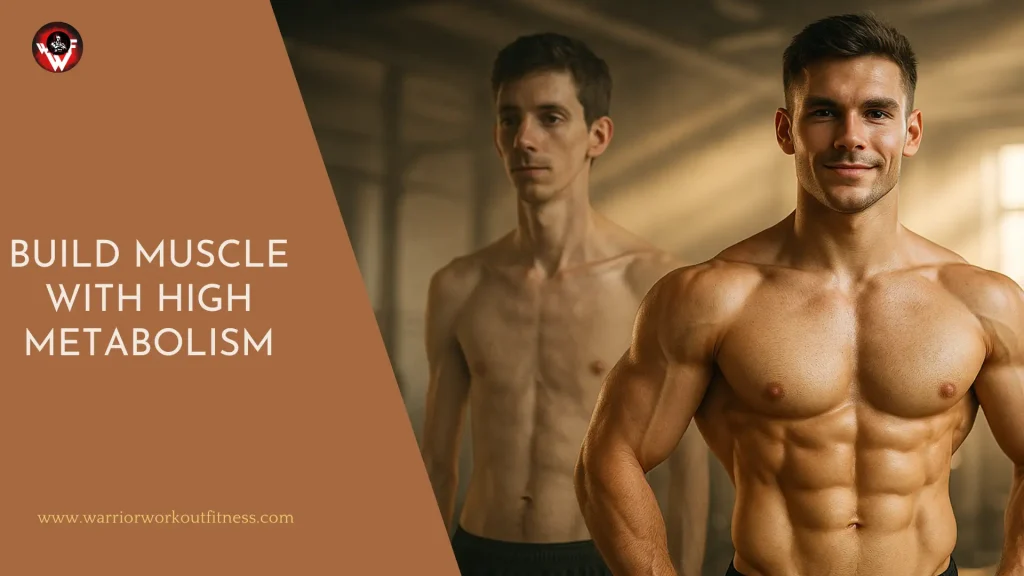
When it comes to building muscle, most people focus on protein powders, chicken breast, and complex carbs. But what if a sweet tropical fruit like mango could also support your fitness goals?
Can eating mango boost your muscle gains? The short answer: Yes—if used correctly. Mango is more than just a juicy summer fruit. It’s packed with powerful nutrients, antioxidants, and digestion-friendly enzymes that can enhance performance and recovery when included in a balanced diet.
In this fully updated, SEO-optimized, and EEAT-compliant guide, we’ll explore:
- Mango’s nutritional value for fitness
- How it helps in muscle recovery
- When to eat mango for maximum results
- Smart ways to include it in your muscle-building meal plan
🍑 Mango Nutrition Profile (Per 1 Cup, 165g — Fresh, Raw)
| Nutrient | Amount |
| Calories | 99 kcal |
| Carbohydrates | 25g |
| Sugars | 23g (natural) |
| Fiber | 3g |
| Protein | 1g |
| Fat | 0.6g |
| Vitamin C | 67% DV |
| Vitamin A | 10% DV |
| Vitamin B6 | 12% DV |
| Folate | 18% DV |
| Magnesium | 4% DV |
| Potassium | 277mg |
| Antioxidants | Polyphenols, beta-carotene, mangiferin |
Mango is naturally low in fat, high in natural sugars, and contains vitamins and antioxidants that aid in recovery, digestion, and performance.
🏋️ Is Mango Good for Muscle Gain?
Yes—when paired with adequate protein and exercise, mango can contribute positively to muscle-building goals.
Here’s how:
✅ 1. Provides Fast-Digesting Carbs for Energy
Mango contains natural sugars like glucose, fructose, and sucrose—ideal for:
- Pre-workout fuel
- Post-workout glycogen replenishment
💡 Muscles store energy in the form of glycogen. After intense training, eating mango can help replenish glycogen stores, improving muscle recovery and reducing fatigue.
✅ 2. High in Vitamin C & Antioxidants for Recovery
Mango offers 67% of your daily Vitamin C in one cup. Vitamin C:
- Supports collagen formation (important for tendons, ligaments, and muscle tissue)
- Acts as a powerful antioxidant, helping reduce oxidative stress and inflammation post-exercise
- Aids iron absorption, which is crucial for oxygen transport to muscles
Bonus: Mangiferin, a unique antioxidant found in mango, has anti-inflammatory and cardio-protective properties.
✅ 3. Promotes Digestion and Nutrient Absorption
Thanks to digestive enzymes like amylase, mango helps break down carbs and improves gut health.
A healthy digestive system means:
- Better nutrient absorption
- Fewer bloating issues during bulking
- Improved appetite regulation
✅ 4. Contains Muscle-Supportive Vitamins & Minerals
- Vitamin B6: Helps in amino acid metabolism and energy production
- Folate: Supports cell division and protein synthesis
- Magnesium & Potassium: Important for muscle contraction, hydration, and reducing cramps
These nutrients enhance muscle performance and optimize recovery between workouts.
🍽️ Best Time to Eat Mango for Muscle Gain
Timing matters when you’re optimizing nutrition for muscle gains. Here’s when mango gives the best return:
🔥 1. Pre-Workout (30–60 mins before):
Mango provides quick-digesting carbs that spike energy levels without making you feel too heavy.
➡️ Ideal Combo: Mango + Greek yogurt or a scoop of whey protein
💪 2. Post-Workout (Within 60 mins):
After strength training, your body needs to:
- Replenish glycogen
- Repair muscle tissue
- Reduce inflammation
Mango combined with protein (like a smoothie) speeds up recovery and growth.
➡️ Ideal Combo: Mango smoothie with whey protein + chia or flaxseeds
🌞 3. Midday Snack (During Bulking):
If you’re in a calorie surplus and need more carbs, mango makes a nutrient-rich snack without processed sugars.
➡️ Ideal Combo: Mango + almond butter toast
🍹 Muscle-Building Mango Recipes
ere are a few easy, gym-approved recipes that fit into a high-protein, muscle-building meal plan:
🥤 1. Mango Protein Smoothie
Ingredients:
- 1 cup fresh mango
- 1 scoop vanilla or unflavored whey
- 1 cup almond milk
- 1 tbsp chia seeds
- Ice (optional)
Macros (approx):
- 280 kcal
- 25g protein
- 30g carbs
- 8g fat
🥣 2. Mango Oats Pre-Workout Bowl
Ingredients:
- ½ cup rolled oats
- 1 cup diced mango
- 1 tbsp peanut butter
- 1 tsp cinnamon
- ½ scoop whey (optional)
Macros (approx):
- 400 kcal
- 20g protein
- 45g carbs
- 12g fat
🥗 3. Mango Chicken Salad
Ingredients:
- Grilled chicken breast
- Fresh mango cubes
- Baby spinach
- Quinoa (½ cup)
- Lemon-olive oil dressing
Macros (approx):
- 450 kcal
- 35g protein
- 30g carbs
- 15g fat
⚠️ Are There Any Downsides?
Mango is incredibly healthy—but like all fruits, moderation is key.
❌ 1. High in Natural Sugar
With ~23g of sugar per cup, mango may spike insulin if overconsumed—especially without protein or fiber.
✅ Tip: Always pair with protein or fat for slower sugar absorption.
❌ 2. Low in Protein
Mango alone doesn’t build muscle—it’s not a protein source. It must be paired with high-protein foods for best results.
❌ 3. Can Be Overeaten in Smoothies
Mango’s sweetness makes it easy to overdo in shakes. Keep portion sizes controlled.
🍑 Mango vs. Other Fruits for Muscle Gains
| Fruit | Carbs | Fiber | Antioxidants | Best For |
| Mango | 25g | 3g | High | Energy + inflammation |
| Banana | 27g | 3g | Moderate | Pre-workout fuel |
| Berries | 15g | 5g | Very High | Recovery + blood flow |
| Apple | 25g | 4g | Moderate | Satiety + blood sugar control |
| Pineapple | 22g | 2g | High (Bromelain) | Digestion + recovery |
Winner? Mango holds its own, especially in the energy + recovery category. It’s not the only fruit you need—but it’s a smart one to include.
👨⚕️ What Experts Say
Registered Dietitians and Sports Nutritionists support fruit intake—like mango—for active individuals. Here’s what they highlight:
“Mango is rich in antioxidants that fight inflammation after strength training. Paired with lean protein, it supports muscle repair and endurance.”
— Amy Goodson, RD, Certified Sports Nutritionist
“Carbs are essential for muscle growth. Mango provides clean, fast carbs along with Vitamin C and magnesium—two nutrients athletes often lack.”
— Dr. Josh Axe, Nutrition Expert
🧠 Final Tips to Use Mango for Muscle Gain
- Combine with Protein: Always pair mango with protein like Greek yogurt, whey, or eggs.
- Portion Smartly: ½–1 cup per serving is usually enough.
- Use Strategically: Before or after workouts = optimal time.
- Go Fresh or Frozen: Avoid syrupy canned versions loaded with added sugar.
- Diversify Your Fruits: Don’t rely solely on mango—rotate with berries, bananas, etc.
💬 FAQs
Q1: Can mango replace a post-workout shake?
Not entirely. Mango provides carbs but not enough protein. Add whey or Greek yogurt to make it effective.
Q2: Is dried mango good for muscle building?
Dried mango is calorie-dense and convenient but often contains added sugar. Use sparingly and choose unsweetened versions.
Q3: How much mango should I eat per day for gains?
1 cup (165g) per day is a great starting point. Adjust based on your calorie and carb needs.
Q4: Can mango help with weight gain during bulking?
Yes! Mango is calorie-rich and easily digestible, making it great for healthy weight gain when combined with high-protein foods.
🔥 Final Verdict: Is Mango a Muscle-Building Superfruit?
Yes—when used right. Mango won’t magically grow muscles on its own, but it supports the process in powerful ways:
✅ Refuels glycogen stores
✅ Fights inflammation
✅ Enhances digestion and nutrient absorption
✅ Boosts energy for intense workouts
✅ Delivers vitamins and minerals key for recovery
Think of mango as the sweet sidekick in your muscle-building journey—especially when paired with the right protein sources and strength training routine.


